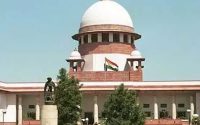$100 Website Offer
Get your personal website + domain for just $100.
Limited Time Offer!
Claim Your Website NowJains of Jodhpur: How a tiny community ruled India’s Supreme Court
Source – theprint.in
Former CJI R.M. Lodha and ex-judges G.S. Singhvi and Dalveer Bhandari all belong to the Oswal Jain community that comprises less than 0.5% of Rajasthan’s population.
New Delhi: The Oswal Jains are a minuscule community in Rajasthan, comprising less than 0.5 per cent of the state’s population, but their prominence in the country’s judiciary is something of a legend.
Consider this: In four years — between 2008 and 2012 — the Supreme Court of India had three judges from the powerful community.
Former Chief Justice of India R.M. Lodha, and former judges G.S. Singhvi and Dalveer Bhandari – who is now the lone Indian member of the International Court of Justice (ICJ) – are not just from the same community, but also related to each other.
And then there are another half-a-dozen others from the community who have been or are serving as high Court.
The Oswals originally come from a small village near Jodhpur called Osianor Ossiya. While many Oswals are Jains, some Hindus also belong to the community.
The careers of the three judges from the Jodhpur-based Rajasthan High Court almost ran parallel to each other’s.
It is unusual for three contemporary judges in the apex court to trace their roots to a high court that is relatively small (Rajasthan High Court has 50 judges), but senior advocate and Congressman Abhishek Manu Singhvi, also an Oswal Jain from Jodhpur, insisted that this was no aberration.
“Elevating three judges from the same state is actually the combination of a coincidence and a correction of the historic under-representation of Rajasthan in the apex court,” he said. “I don’t see why when, once in a blue moon there are three judges from Rajasthan, all of very high merit, questions are raised, whereas a permanence of three from Delhi or Mumbai or, as in 1960s, from Calcutta, passes unnoticed.”
Justice G.S. Singhvi
Born on 12 December, 1948, Justice Singhvi was just 42 when he was elevated as a judge of the Rajasthan High Court.
A gold medalist from Rajasthan University, Singhvi was a practising lawyer for over 19 years before he was appointed a judge. His father M.M. Singhvi was also a renowned advocate in Jodhpur.
Singhvi went on to serve as a judge in the Punjab and Haryana High Court and the Gujarat High Court before being made the chief justice of the Andhra Pradesh High Court in 2005.
He was elevated as a judge of the Supreme Court in 2007, retiring as its second most senior judge in 2013.
While he was at the Punjab and Haryana High Court, Singhvi, the most senior judge, was alleged to have spearheaded an unprecedented judges’ strike against the then Chief Justice B.K. Roy and subsequently transferred to the Andhra Pradesh High Court.
This setback delayed Singhvi’s elevation to the Supreme Court and ultimately cost him the post of Chief Justice of India (CJI).
Singhvi’s brother Shyam Singh Singhvi, a senior official at the National Highways Authority of India (NHAI), is married to former CJI Lodha’s sister.
While both Lodha and Singhvi were in the SC, the CBI raided Shyam Singhvi’s residences in connection with a case of alleged graft.
In 2013, Shyam Singhvi was also alleged to have outraged the modesty of two female employees of the Gauhati High Court at a judges’ guest house. The Bar association of the high court subsequently wrote to the then CJI, Altamas Kabir, seeking an investigation against him.
Justice Singhvi’s nephew, Sandeep Mehta, also an Oswal Jain, is currently a judge in the Rajasthan High Court. Arun Bhansali, another sitting judge of the Rajasthan High Court and an Oswal Jain, was a junior of another of Justice Singhvi’s brothers, Mahendra Singh Singhvi.
After his retirement, Justice Singhvi was appointed chairman of the Competition Appellate Tribunal in 2014. In 2016, the government appointed him as its main arbitrator in the $1.55 billion dispute with Reliance Industries Ltd (RIL) over the pricing of gas from the KG D6 basin.
Last year, the National Company Law Tribunal appointed Singhvi as a board member with voting rights for fast food giant McDonald’s estranged partner company, Connaught Plaza Restaurant Ltd (CPRL).
Justice R.M. Lodha
Born on 28 September, 1949, Justice Lodha was 45 when appointed a judge in the Rajasthan High Court.
He was, at the time, a well-known advocate in Jodhpur and Jaipur with a practice of over two decades.
His father Srikrishna Mal Lodha was a judge in the Rajasthan High Court, while his uncles Chand Mal Lodha and Guman Mal Lodha retired as the chief justices of high courts.
Guman Lal Lodha went on to join the Jana Sangh and enter Parliament. He also headed the National Commission on Cattle, a government agency set up in 2001, that recommended the Centre bring in a law to prohibit the slaughter of cows when Atal Bihari Vajpayee was prime minister.
Within two weeks of his appointment as a permanent judge in the Rajasthan High Court, Justice Lodha was transferred to the Bombay High Court, where he served for 13 years.
When Justice Swatanter Kumar, junior to Lodha, was appointed the Chief Justice of the high court, Lodha sought a transfer to his hometown.
In May 2008, he was appointed chief justice of the Patna High Court, and elevated to the Supreme Court that December. His stint as the CJI in 2014 lasted a little more than six months.
After his retirement, the Supreme Court appointed Lodha to head three-high-profile committees, including on cricket and the administration of medical colleges.
Justice Dalveer Bhandari
Born on 1 October 1947, Justice Bhandari was 44 when appointed a judge in the Delhi High Court.
He came from a family of renowned lawyers in Jodhpur, and his father Mahaveer Chand Bhandari and grandfather B.C. Bhandari were both members of the Rajasthan bar.
After obtaining a master’s degree from Northwestern University, US, he shifted his practice from Jodhpur, where he was a lawyer at the Rajasthan High Court, to Delhi. After 18 years of practice, he became a judge, and was appointed the Bombay High Court chief justice in 2004.
He became a Supreme Court judge in 2007, but resigned in 2012 when he entered the ICJ race as India’s representative. He was re-elected to the court in 2017 after a close race with the British candidate.
Justice Singhvi’s wife Ranjana Singhvi is Bhandari’s first cousin.



